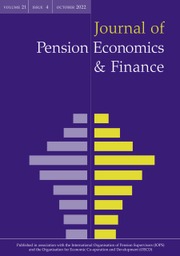No CrossRef data available.
Investment in employer shares, incentive alignment, and monitoring
Published online by Cambridge University Press: 11 June 2007
Abstract
It is well documented that US defined contribution pension plans are largely invested in the shares of their employer. I argue that when the (single representative) worker holds shares in the firm, he tends to monitor the manager. On the one hand, the manager and shareholders gain from the productivity of the worker. On the other hand, the manager bears the cost of being monitored by the worker, and the shareholders loose part of their ownership power to the worker. Therefore, there is an optimal ownership limit for the worker from the viewpoint of the firm. I derive conditions under which the worker will never invest in the firm's stock if he has the freedom to do so. Nevertheless, under alternative conditions, it will be advantageous for the worker to invest his pension assets heavily in company stock, even if the under-diversification cost is very high.
- Type
- Research Article
- Information
- Copyright
- © 2007 Cambridge University Press




